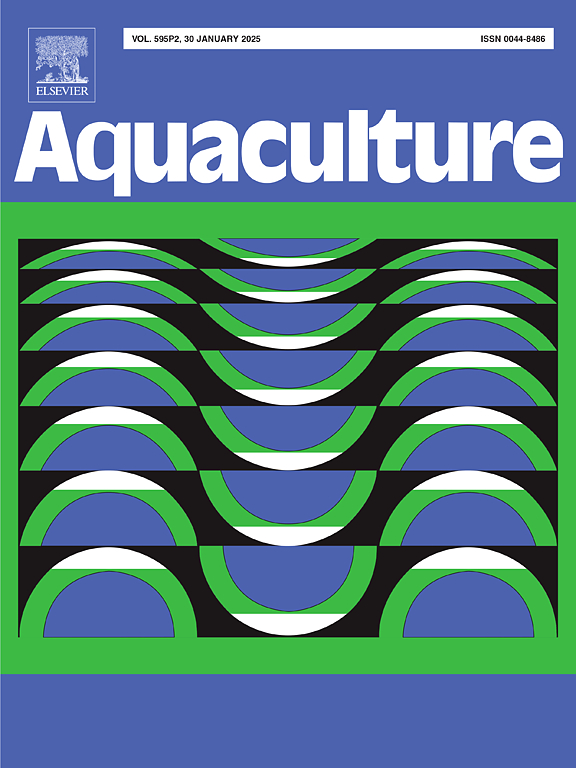Energy modulation in Atlantic salmon: Oleic acid increases adipogenesis and energy deposition
IF 3.9
1区 农林科学
Q1 FISHERIES
引用次数: 0
Abstract
Due to climate change, water temperatures in Tasmania (Australia) summer are rising at 0.4 °C per decade, exceeding the upper thermal tolerance limits of Atlantic salmon, leading to reduced feed intake, increased metabolic rate, and energy loss. These suboptimal conditions affect growth performance and quality of the final products. Thus, higher energy storage in salmon tissue prior to summer has been envisaged as a strategy to minimise the detrimental effects of this culture phase. The objective of this study was to investigate if dietary oleic acid could increase energy storage in visceral adipose tissue of juvenile Atlantic salmon reared under pre-summer conditions (15 °C), primarily as triacylglycerols, and assess whether it was more effective than high-lipid diets for energy modulation. For this, four diets were formulated and manufactured with two different levels of oleic acid (high and low) and two different total lipid (high and low) and fed to Atlantic salmon (71.8 ± 0.20 g) for 124 days. The results showed Atlantic salmon fed high-lipid diets demonstrated higher growth performance compared to the low-lipid diets, with a significantly lower feed conversion ratio, higher digestible energy retention, and higher triacylglycerol concentration in the fillet. High-oleic acid diets resulted in significantly higher total lipid and triacylglycerol concentrations in visceral adipose tissue compared to low-oleic acid diets. This was achieved via adipocyte hyperplasia originated from the increased provision of the energy substrate, oleic acid, in visceral adipose tissue lipid for triacylglycerol synthesis. Diets containing low lipid and high oleic acid accumulated the highest metabolic energy in visceral adipose tissue and can be considered a viable energy modulation strategy for Atlantic salmon. However, further investigation is needed to understand the long-term effects of triacylglycerol accumulation on fish health to ensure commercial viability.
大西洋鲑鱼的能量调节:油酸增加脂肪生成和能量沉积
由于气候变化,塔斯马尼亚(澳大利亚)夏季水温每十年上升0.4°C,超过了大西洋鲑鱼的耐热上限,导致采食量减少,代谢率增加,能量损失。这些次优条件影响了最终产品的生长性能和质量。因此,在夏季之前,鲑鱼组织中更高的能量储存被认为是一种最小化培养阶段有害影响的策略。本研究的目的是研究在夏季前(15°C)条件下饲养的大西洋鲑鱼幼鱼,其饮食中的油酸是否可以增加内脏脂肪组织中的能量储存,主要是作为三酰基甘油,并评估它是否比高脂饮食更有效地调节能量。为此,配制了2种不同油酸水平(高、低)和2种不同总脂质水平(高、低)的饲料,饲喂大西洋鲑鱼(71.8±0.20 g),饲喂124 d。结果表明:与低脂饲料相比,饲喂高脂饲料的大西洋鲑鱼表现出更高的生长性能,饲料系数显著降低,可消化能量蓄积量显著提高,鱼片中甘油三酯含量显著提高。与低油酸饲粮相比,高油酸饲粮导致内脏脂肪组织中总脂和甘油三酯浓度显著升高。这是通过脂肪细胞增生实现的,脂肪细胞增生源于内脏脂肪组织脂质中用于三酰甘油合成的能量底物油酸的增加。含有低脂和高油酸的饮食在内脏脂肪组织中积累了最高的代谢能量,可以被认为是大西洋鲑鱼可行的能量调节策略。然而,为了确保商业可行性,需要进一步调查以了解三酰甘油积累对鱼类健康的长期影响。
本文章由计算机程序翻译,如有差异,请以英文原文为准。
求助全文
约1分钟内获得全文
求助全文
来源期刊

Aquaculture
农林科学-海洋与淡水生物学
CiteScore
8.60
自引率
17.80%
发文量
1246
审稿时长
56 days
期刊介绍:
Aquaculture is an international journal for the exploration, improvement and management of all freshwater and marine food resources. It publishes novel and innovative research of world-wide interest on farming of aquatic organisms, which includes finfish, mollusks, crustaceans and aquatic plants for human consumption. Research on ornamentals is not a focus of the Journal. Aquaculture only publishes papers with a clear relevance to improving aquaculture practices or a potential application.
 求助内容:
求助内容: 应助结果提醒方式:
应助结果提醒方式:


